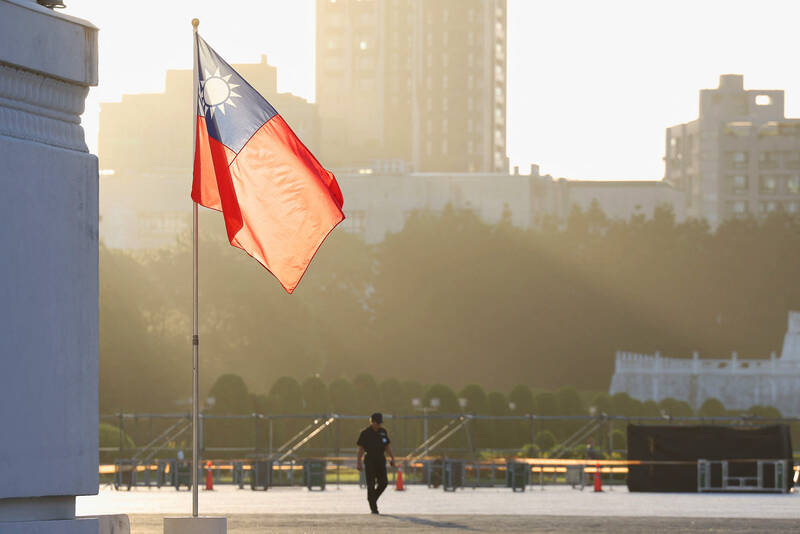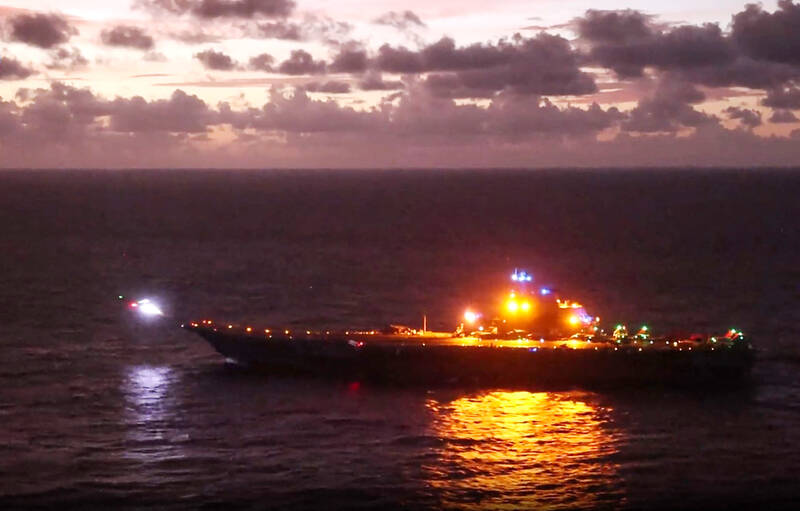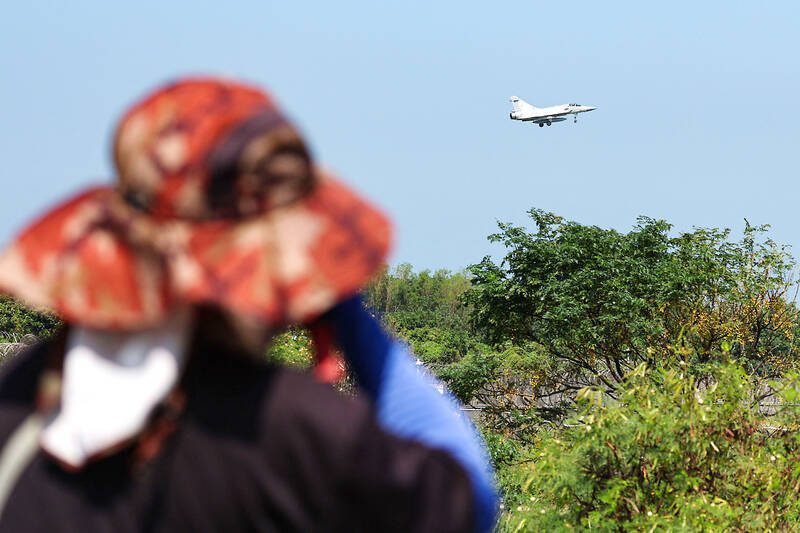There is considerable speculation among foreign, and particularly US, observers of when Beijing will launch an invasion — made existential with Monday’s military drills around Taiwan. The most famous is the “Davidson window,” named after then admiral leading the US Indo-Pacific Command Philip Davidson, who told a Senate Armed Services Committee in 2021: “I think the threat is manifest during this decade, in fact in the next six years.”
Chinese leader Xi Jinping (習近平) has told the People’s Liberation Army (PLA) to be ready to invade Taiwan by 2027. CIA Director William Burns, however, has said that a military conflict is “not inevitable,” but that the US must take the possibility “very seriously.” Burns also said last year that the CIA’s assessment is that Xi and the PLA leadership harbored doubts about their ability to invade Taiwan in light of the Russian experience in Ukraine.
While 2027 is a popular date for speculation, so is 2035 and 2049. American officials have given a wide range of dates, some as early as next year. That there is so little agreement is interesting in itself: It means that the American establishment has no clue. It is the same in Taiwan, in other countries and even among the Chinese themselves: No one knows.

Photo: AFP
According to a poll commissioned by the Institute for National Defense and Security Research last month, 61 percent of Taiwanese believed China was unlikely to launch an attack in the next five years, though almost 64 percent said China’s “territorial ambition” in Taiwan represents “a serious threat.”
Popular reasons for dates given include the American electoral calendar, old military hardware being phased out for new, Xi vying for a fourth term in office, Chinese demographics and anniversaries of various Chinese Communist Party (CCP) and PLA events. Some of these may indeed be factors, but these analyses almost always miss the key element of how and why they would fit into Xi and the CCP leadership’s calculations.
As explored in two previous columns — “China is already at war with Taiwan and countries across the globe,” on Oct. 5 and “Quarantining and blockading Taiwan are Beijing’s next steps,” on Oct. 15 — the CCP is already at war with Taiwan and many other countries. Many countries have woken up to this and have started to respond in kind.

Photo: AFP
Whether a blockade would bring in other nations would probably depend on how extensive it was. Invasions of Penghu and Taiwan itself would provoke a military response by the US, at least as long as Biden remains president and probably under a Harris presidency. Trump is harder to predict and much will depend on who he appoints to key positions.
The question of when the CCP decides to invade is both very easy to answer, and enormously complicated. Considering an American or international response would be significant factors in Beijing, but it is far from the number one consideration.
THE CCP’S PURPOSE

Photo: AFP
The CCP’s purpose is to maintain and expand its power. Conversely, they are deeply paranoid about losing it.
This fundamental truth about the CCP is what many analysts overlook as primary objectives. Once looked at through this lens, the decisions coming out of Beijing make a lot more sense.
Since by far the biggest element upholding the CCP’s power is domestic, that is by far its number one priority. The “wolf warrior diplomacy” that seemed so self-defeating on the diplomatic level was not primarily aimed at international audiences. It was red meat for the nationalist base.
However, as China’s economy has stumbled and they turn to heavily subsidized exports to fuel their economy and much of the Western world began to stand up to China’s bullying behavior, they have toned down — though not completely abandoned — the “wolf warrior” attitude. Incidentally, though it may have originally stemmed from paranoia, the push in recent years to get Chinese to view all foreigners as potential spies and enemies may have also taken up some of the nationalistic slack from toning down “wolf warrior diplomacy.”
WHEN BEIJING WILL DECIDE TO INVADE TAIWAN?
The answer to when Beijing decides to invade Taiwan is simple: The decision will come when Xi Jinping calculates that doing so will do more to maintain and expand his and the CCP’s power than it will cost. This is how all decisions are made in Zhongnanhai.
The complicated part is figuring out how that calculation would be made. Probably the most basic calculation is the Chinese public.
While the CCP does not care about average Chinese people, it does care about them in aggregate because ultimately the CCP’s ability to remain in power depends on them, whether previously through the carrot of a booming economy or now through rapidly increasing repression, growing state control over individual lives and a massive expansion of the surveillance state. The CCP’s goal is not to do what is good for the Chinese people, but to do what is good for the CCP.
Determining how much the public would support an invasion and how long they would continue to support it without launching a revolt as the economy collapses and the body bags mount is what would concern Xi the most, though considering the history of the CCP it is possible he could fear an internal coup more. Regardless, these two would be the highest concerns.
Internally, launching a war would allow PLA soldiers far more ready access to weapons than they do now due to strict controls. However, the lack of a revolt by Russians in spite of the “meat grinder” conditions they have subjected their troops to is probably encouraging to Xi.
On the other hand, the embarrassment of Russia’s failure to make much headway in spite of the previously fearsome reputation of their military may give Xi some pause. Stoking nationalism is one of the CCP’s power tools, and getting embarrassed to this degree may be viewed as more risky than it is worth — maintaining and expanding power is the goal, not losing it.
Xi would give little thought about the carnage on either side and that much of the PLA would end up at the bottom of the Taiwan Strait because human lives are irrelevant, only whether the impression can be created that they are winning or are successful in some way.
CONTINUED ESCALATION
Unless the situation changes dramatically — and unfortunately with China’s systemic economic and structural problems it is possible — Xi is likely to keep escalating and pushing the envelope, but continue kicking a full-scale invasion down the road. There is no doubt that Xi is serious about eventually taking Taiwan, but he will want to do it the least costly and risky way possible.
This means continuing to expand their “anaconda strategy” militarily, economically, legally, politically and psychologically to continue to wear down Taiwan and push it toward an eventual capitulation under a more CCP-friendly administration.
The next escalation is likely to come in the form of quarantine, blockages or one morphing into the other. The Chinese Coast Guard and the PLA have been practicing for both, and have begun some limited quarantine and blockade activities already, which will be explored in a future column.
Donovan’s Deep Dives is a regular column by Courtney Donovan Smith (石東文) who writes in-depth analysis on everything about Taiwan’s political scene and geopolitics. Donovan is also the central Taiwan correspondent at ICRT FM100 Radio News, co-publisher of Compass Magazine, co-founder Taiwan Report (report.tw) and former chair of the Taichung American Chamber of Commerce. Follow him on X: @donovan_smith.

In the next few months tough decisions will need to be made by the Taiwan People’s Party (TPP) and their pan-blue allies in the Chinese Nationalist Party (KMT). It will reveal just how real their alliance is with actual power at stake. Party founder Ko Wen-je (柯文哲) faced these tough questions, which we explored in part one of this series, “Ko Wen-je, the KMT’s prickly ally,” (Aug. 16, page 12). Ko was open to cooperation, but on his terms. He openly fretted about being “swallowed up” by the KMT, and was keenly aware of the experience of the People’s First Party

Aug. 25 to Aug. 31 Although Mr. Lin (林) had been married to his Japanese wife for a decade, their union was never legally recognized — and even their daughter was officially deemed illegitimate. During the first half of Japanese rule in Taiwan, only marriages between Japanese men and Taiwanese women were valid, unless the Taiwanese husband formally joined a Japanese household. In 1920, Lin took his frustrations directly to the Ministry of Home Affairs: “Since Japan took possession of Taiwan, we have obeyed the government’s directives and committed ourselves to breaking old Qing-era customs. Yet ... our marriages remain unrecognized,

Not long into Mistress Dispeller, a quietly jaw-dropping new documentary from director Elizabeth Lo, the film’s eponymous character lays out her thesis for ridding marriages of troublesome extra lovers. “When someone becomes a mistress,” she says, “it’s because they feel they don’t deserve complete love. She’s the one who needs our help the most.” Wang Zhenxi, a mistress dispeller based in north-central China’s Henan province, is one of a growing number of self-styled professionals who earn a living by intervening in people’s marriages — to “dispel” them of intruders. “I was looking for a love story set in China,” says Lo,

Standing on top of a small mountain, Kim Seung-ho gazes out over an expanse of paddy fields glowing in their autumn gold, the ripening grains swaying gently in the wind. In the distance, North Korea stretches beyond the horizon. “It’s so peaceful,” says the director of the DMZ Ecology Research Institute. “Over there, it used to be an artillery range, but since they stopped firing, the nature has become so beautiful.” The land before him is the demilitarized zone, or DMZ, a strip of land that runs across the Korean peninsula, dividing North and South Korea roughly along the 38th parallel north. This